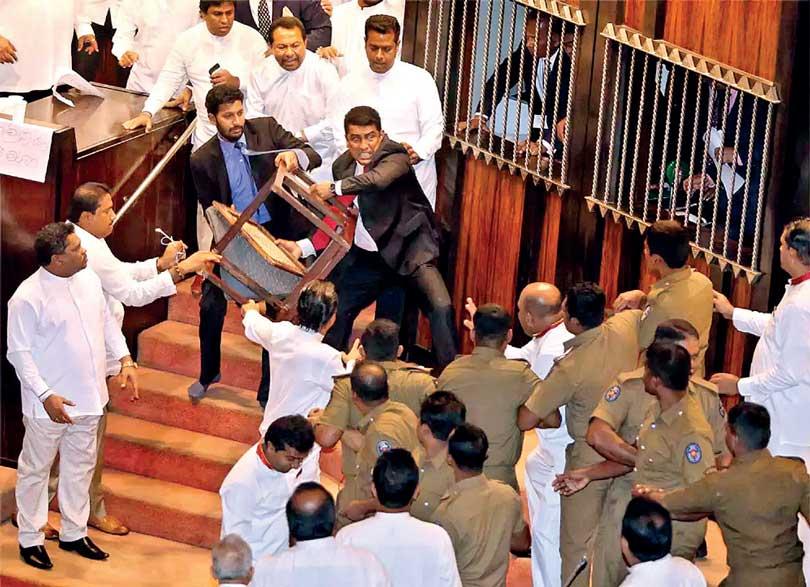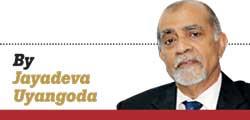24 May 2022 - {{hitsCtrl.values.hits}}

High drama at the Parliamentary Lobby; During a commotion in the Parliament former Minister Johnston Fernando attacking the opposition with a chair (File photo)
 One key issue highlighted by Sri Lanka’s citizen protest movement is the crisis of the country’s representative democracy. It is at the core of the larger political and constitutional crisis. The continuing erosion of public trust in the elected President, the elected parliament, and the ministers has become a regular feature of Sri Lanka’s current political crisis too. The inability of the individuals who populate the key institutions of government to do much to restore public trust is making the ongoing crisis intractable too. The flippant behaviour of the so-called experienced crisis managers has not been helpful either. Meanwhile, superficial or piecemeal constitutional reforms, designed to protect the interests of the discredited political elites, can hardly address either the country’s general political crisis or the crisis of democracy.
One key issue highlighted by Sri Lanka’s citizen protest movement is the crisis of the country’s representative democracy. It is at the core of the larger political and constitutional crisis. The continuing erosion of public trust in the elected President, the elected parliament, and the ministers has become a regular feature of Sri Lanka’s current political crisis too. The inability of the individuals who populate the key institutions of government to do much to restore public trust is making the ongoing crisis intractable too. The flippant behaviour of the so-called experienced crisis managers has not been helpful either. Meanwhile, superficial or piecemeal constitutional reforms, designed to protect the interests of the discredited political elites, can hardly address either the country’s general political crisis or the crisis of democracy.
Sri Lanka’s crisis of representative democracy is one rooted in the tradition of liberal democracy as well as liberal-democratic constitutionalism. In many societies, representative democracy has also been pushed into crisis by factors specific to the political history of each society. So, Sri Lanka has its own self-made aspects of the crisis of representative democracy.
The inability of the individuals who populate the key institutions of government to do much to restore public trust is making the ongoing crisis intractable too
Abuse of Democracy
Sri Lanka’s democracy has been subjected to abuse and assault by different factions of the country’s political elite since independence. Elites have abused democracy to reach their undemocratic goals as well as to legitimise illiberal and undemocratic projects. Sri Lanka’s two dominant parties, the UNP and SLFP, and factions of the ruling class organised in these two parties have been the key contributors to the deepening of Sri Lanka’s erosion of democracy and loss of public trust in representative democracy through abuse and misuse. Occasionally, these parties have also joined with citizens in attempts to restore democracy. However, the elite’s commitment to democratisation has always been half-hearted and instrumentalist. They have been involved in thwarting citizens’ efforts to bring democracy back to politics. These elites have also succeeded in converting citizens’ political judgement towards achieving wholly counter-democratic political options and projects, as happened in 1978, 2010, and 2019. Thus, Sri Lanka’s political elites have become notorious for institutionalising de-democratisation through democratic means.
Despite frequent setbacks to the democratic process as a whole, Sri Lanka’s electoral democracy has survived, primarily for two reasons. Firstly, the ordinary citizens have kept their faith in the democratic principle of choosing their rulers and giving them the consent and authority to rule over them. There seems to be an unshakable belief among Sri Lanka’s citizens that the people are sovereign, and sovereignty entails the principle that people are the ultimate holders of political power. It is this belief in popular sovereignty, a fundamental premise in a modern democracy, that seems to have animated Sri Lanka’s contemporary citizens’ protest movement too.
The second is a default factor. The political elites, while transforming the politics in the direction of executive authoritarianism, have also kept the principle of electoral democracy intact in order to secure popular legitimacy for their rule. This is primarily an instrumentalist approach to democracy and elections as means of legitimating political power. It is that instrumentalist use of democracy that has contributed to the erosion of the democratic quality of representative democracy in Sri Lanka. Nevertheless, electoral democracy has shown a remarkable capacity to return amidst bouts of retreats because of the peoples’ faith in the idea that rulers are made by the people, and not vice versa, in the exercise of their sovereignty. As the people’s enthusiastic participation in the current citizens’ movement shows, ‘popular sovereignty’ is the most powerful democratic idea to inspire a new phase of civic democratic activism in Sri Lanka.
Elite Capture
The elite capture of democracy is the other major factor that has contributed to the crisis of Sri Lanka’s representative democracy. Elites have turned citizens into passive participants of a process of government in which the citizens’ role is limited to mere voters in an election process which has now come under the corroding influence of the big business. The fact that the election processes are manipulated and controlled by a coalition of the corrupt has now become a permanent feature of Sri Lanka’s representative democracy. The coalition includes wealthy backers of political parties, business elites who have become the unseen handlers of political leaders, and the manipulatory mass media enterprises whose owners view candidates simply as branded or brandable commodities to be sold to the gullible voters for profit. That is why the present movement of citizens’ protests should be seen as a revolt by the demos against that coalition of the corrupt. It indeed urges the point that Sri Lanka is in need of a democratic revolution through which the ordinary citizens, the true demos, can wrest possession of representative democracy as a ‘public thing’, res publica.
The elite capture of representative democracy has also been facilitated by a major weakness built into the very nature of representative democracy with liberal theoretical roots. The liberal conception of democracy evolved during the late 17th century and after in Europe, views ‘people’ as the source of political power in society and assuming that by electing their representatives on trust, they give their ‘consent’ to those representatives along with a ‘mandate’ to govern them. However, between two elections people have no means to hold their representatives to account, or recall the consent and the mandate given to them, except by waiting till the next parliamentary elections five years hence. Thus, elections are the moment when the citizens as voters get a chance to either to reconfirm the mandate or withdraw it, or to give the mandate to a new set of representatives.
It is this long gap between two elections, without offering a chance to the electors to withdraw the mandate in between, is seen by some Sri Lankan citizens these days as harmful to people’s sovereignty. In Sri Lanka’s current case, it appears that a large number of citizens who voted for President Gotabaya Rajapaksa in 2019 feel that he has violated the trust they placed on him and therefore he has no moral right to continue in office. Campaigning for the President’s resignation, on the belief that the President no longer possesses the people’s mandate, is the only option available at present to voters who have lost the trust in the President. With regard to the Members of Parliament too, a similar demand has received much traction with the people. We have a moment in Sri Lanka where the rulers have, from the point of view of many people, lost the moral authority to rule.
Sri Lanka’s democracy has been subjected to abuse and assault by different factions of the country’s political elite since independence. Elites have abused democracy to reach their undemocratic goals as well as to legitimise illiberal and undemocratic projects
Betrayal of Trust
This generalised feeling of betrayal of the trust is a key source of anger that people often show towards their elected representatives. More than ever, the people in Sri Lanka are now acutely aware of the embarrassingly low quality of their MPs, Ministers and even those elected to the office of President. This attitude of ‘low quality’ of the elected leaders encompass a range of blemishes that people observe particularly in their MPs and Ministers so regularly – lack of education, professionalism, or a basic sense of civility, lack of integrity and political ethics among the uneducated and the well - educated alike, embracing of corruption almost as an entitlement in public office, the utter disregard for the notion that the elected office is solely for the public good, shameless conviction that political power has no limits, and the distinct incapacity to show remorse to the misery of the people caused by their own wrong policy decisions.
What most of the MPs and their party leaders have been displaying in and outside parliament is that Sri Lanka has, after nearly a century of universal franchise, produced a political class about which citizens can only feel rather awkward, even ashamed. Specifying educational qualifications for MPs, strict laws for asset declarations and conflict of interest, auditing of income of elected and public officials, strengthening the mandate of the bribery commission to probe ministers and international investigations into allegations of overseas assets of politicians are some of the remedies being discussed by the public at present.
This is the background that has led to the increasing demand in Sri Lanka at present that for any new constitutional reform exercise to be meaningful, it should also grant the citizens the right to recall the mandate given to their elected representatives, president downwards.
This generalised sense of betrayal and anger among the citizens against the dominant culture of representative democracy has also led to there-surfacing of the claim that a ‘new political culture’ should be part of a meaningful reform initiative. Interestingly, the old liberal metaphor of ‘social contract’ has been revived in Sri Lanka’s current political discussions as a conceptual tool for re-framing the relationship between the elected and the elector, the ruler and the ruled.
The growing demand for the right to recall, as a component of the new democratic culture envisaged, has implications for the theory of democratic representation. It goes beyond the limits of liberal constitutional theory of representation since recall is a measure in direct democracy associated with the republican political theory. Despite the fact that the right to recall is a Euro-Western idea, it has re-emerged in Sri Lanka during the past few weeks as part of an indigenous democratic thought developed among the citizens, out of their own negative experiences of a distorted version of liberal representative democracy.
In brief, Sri Lanka’s new citizens movement not only presents a critique of the existing structures and practices of Sri Lanka’s politics. It has brought home the point that re-democratisation of Sri Lanka’s politics calls for addressing the crisis of representative democracy too. The citizens’ political intervention also embodies a new democratic political thought that has slowly evolved among the people of Sri Lanka over a period of several decades. Highlighting the crisis of representative democracy with a host of fresh ideas for re-democratising democracy are aspects of that civic democratic political thought.
The writer is Professor of Political Science attached to the Dept. of Political Science and Public Policy at the University of Colombo.
26 Dec 2024 9 hours ago
26 Dec 2024 26 Dec 2024
26 Dec 2024 26 Dec 2024
26 Dec 2024 26 Dec 2024
26 Dec 2024 26 Dec 2024